Sarmathura
Sirmuttra, Sirmathura | |
|---|---|
Town (small City) | |
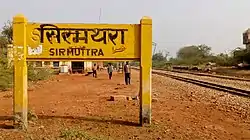 Sarmathura Railway Station | |
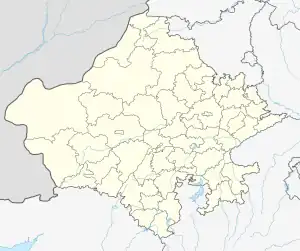 Sarmathura Location in Rajasthan, India | |
| Coordinates: 26°30′42″N 77°22′11″E / 26.5117°N 77.3698°E | |
| Country | |
| State | Rajasthan |
| District | Dholpur |
| Elevation | 209.630 m (687.762 ft) |
| Population (2011) | |
| • Total | 17,988 |
| Languages | |
| • Official | Hindi |
| Time zone | UTC+5:30 (IST) |
| PIN | 328026 |
| Telephone code | 05646 |
| ISO 3166 code | RJ-IN |
| Vehicle registration | RJ- |

Sarmathura is a subdivision located in Dholpur district, in the Indian state of Rajasthan.
The Sarmathura subdivision is a substantial source of sandstone. Historically, red sandstone from Sarmathura was used for the regional construction of Talab-e-Shahi, Jubilee hall Dholpur, Dholpur Palace and the Nihal Clock Tower.[1] National monuments such as the Red Fort and Humayun Tomb are also made from Dholpur red sandstone, which was extracted from the Sarmathura and Bari area.[2]
The local languages are Hindi and Khadi Boli. The town's primary exports include red sandstone, sweet millet, and mustard.
Sirmathura was established in the 15th century by Maharaj Shree Rao Mukat (Jadaun) who ruled from Sirmathura an area of 400 sq. km (36 villages) as an independent territory.
Geography
The nearest town is Bari, and the nearest district is Karauli, Dholpur. It is situated near the river Chambal in Rajasthan district.
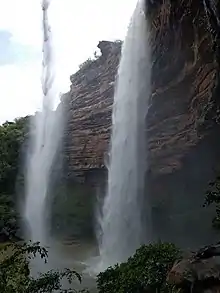
The Damoh Waterfall is 300 ft. high and is visible during the monsoon season, July through September.[3][4]
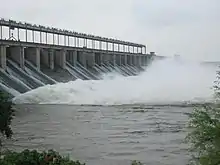
Situated on the Parvati River, Parvati Dam has 22 gates to release water downstream.[5]
Demographics
Sarmathura has a population of 17,988 in 2,950 households, of which 54% are male and 46% are female, lower than the Rajasthan average. 77% belong to forward castes, 17% belong to scheduled caste, and 6% belong to scheduled tribes. 3,147 of Sarmathura's residents are children under 6, of whom 44% are boys and 56% are girls, a lower ratio than the state.
62.90% of the town's population practice Hinduism, and 37.02% practice Islam. Other religions are also present.
The literacy rate of Sarmathura is 86.18%, roughly equal to the Rajasthan state average of 76.11%. In Sarmathura, the male literacy is around 76.86% and the female literacy rate is 53.84%.[6][7]
Category wise male female population 2011
| Total | General | Scheduled Caste | Scheduled Tribe | Child | |
|---|---|---|---|---|---|
| Total | 17,988 | 13,897 | 3,019 | 1,072 | 3,147 |
| Male | 9,649 | 7,422 | 1,649 | 578 | 1,690 |
| Female | 8,339 | 6,475 | 1,370 | 494 | 1,457 |
Religion data 2011
| Town | Population | Hindu | Muslim | Christian | Buddhist | Jain | Others | Not Stated | |
|---|---|---|---|---|---|---|---|---|---|
| Sarmathura | 17,988 | 62.90% | 37.02% | 0.02% | 0.00% | 0.01% | 0.01% | 0.00% | 0.04% |
Literacy data 2011
| Yes | No |
|---|---|
| 66.2% | 33.8% |
Transport
Dholpur–Sarmathura Railway
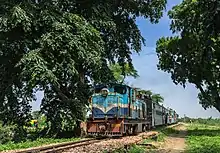
The Dholpur–Sarmathura narrow gauge rail line is 2'6" ft. and the distance from Sarmathura to Dholpur is 72 km. This rail line is mainly used to export sandstone. It was built in 1908 during the reign of King Ram Singh and was completed in 1929. A passenger train now operates on this route.[8] The railway is converting to 1,676 mm (5 ft 6 in) broad gauge.
References
- ↑ Binayak, Poonam. "Why Rajasthan's Lesser-Known Locations Are Worth Visiting". Culture Trip. Retrieved 5 March 2018.
- ↑ "Dholpur - the Land of Red Stone".
- ↑ Anand Prakash Joshi: "Rajasthan Patrika Year Book" (Hindi) p. 757, Damoh Waterfall Sarmathur
- ↑ "प्राकृतिक हरितमा के आगोश में दमोह". M.patrika.com. Retrieved 19 October 2017.
- ↑ Anand Prakash Joshi: "Rajasthan Patrika Year Book" (Hindi) p. 756
- ↑ Sarmathura Town Census Census 2011 Data-censusindia.gov.in Office of the Register General & Census Commissioner, India.
- ↑ Dholpur-Rajasthan. "Blocks/Tehsils/Panchayats". Dholpur.rajasthan.gov.in. Retrieved 19 October 2017.
- ↑ Anand Prakash Joshi (2016) : "Rajasthan Patrika Year Book" (Hindi) p.755, Dholpur-Sarmathura unique Narrow Gauge rail line
External links
- "[IRFCA] Ian Manning on the Indian Railways - Dholpur". Irfca.org. Retrieved 19 October 2017.
- "Rajasthan: Take a DeTOUR for a Stone Sejourn!". Issuu.com. Retrieved 19 October 2017.
- "Sarmathura Literacy Data Table 2011". citypopulation.de. Retrieved 15 February 2018.
- "Dholpur". tourism.rajasthan.gov.in. Retrieved 21 February 2018.